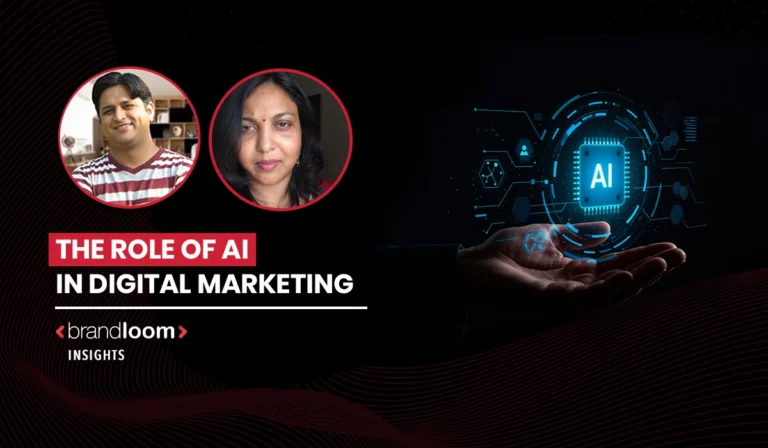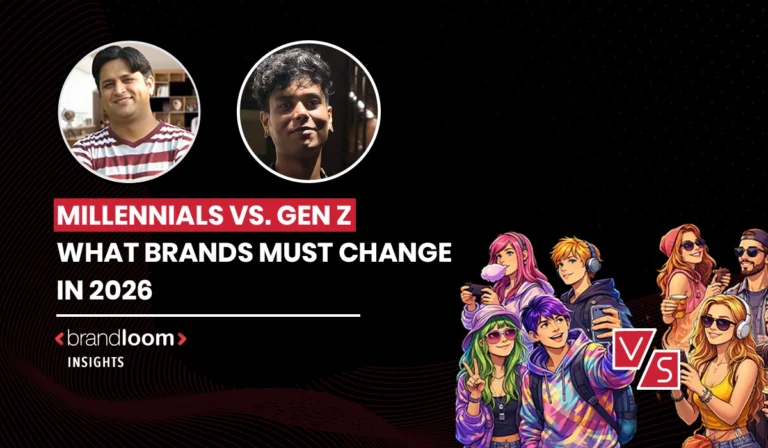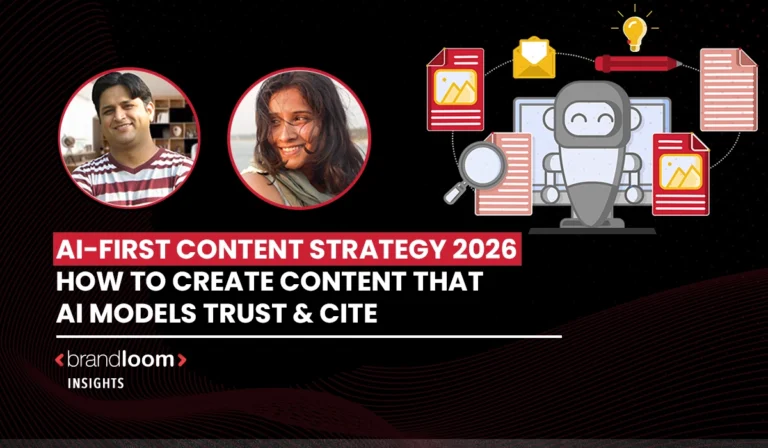The current marketing landscape has experienced a major shift because of AI in digital marketing environments. Artificial intelligence provides dual benefits to marketing departments that need to achieve more with fewer resources.
AI removes uncertainty while speeding up operations and allows businesses to achieve precise results. Modern customers desire individualized interactions combined with prompt and pertinent content throughout their entire buying experience. Standard approaches, which include manual customer grouping, generic email distribution, and unplanned tactics, fail to match current demands.
Marketing professionals report that AI delivers superior customer experiences through data-driven intelligent interactions, according to Salesforce’s State of Marketing report (2023), which states that 68% of marketers agree with this statement.
Whether you’re managing a business, leading a marketing team, or scaling your brand, staying ahead of AI trends is crucial. And when it comes to navigating this shift, you don’t have to do it alone.
That’s where BrandLoom comes in.
As a leading digital marketing agency in India, we’ve created this guide to help you understand and apply AI in ways that drive actual growth. Stop reacting—start leading. At BrandLoom, we use AI to craft proactive, personalized, and scalable marketing strategies that help you stay ahead of the curve and drive real growth.
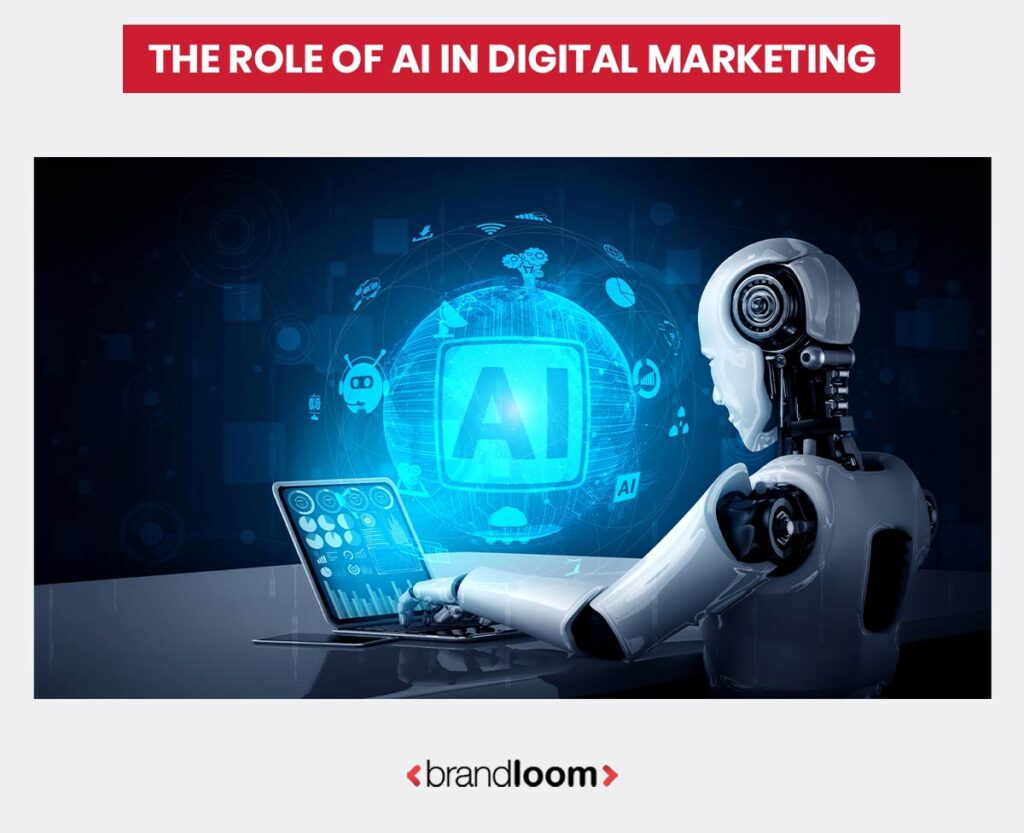
How AI Is Reshaping Marketing Fundamentals
AI isn’t just another tool in the marketer’s kit—it’s redefining how we think about marketing at every level. From audience research to performance measurement, AI has fundamentally shifted the way we operate. Here’s how:
1. Smarter, Real-Time Audience Insights
The days of relying solely on static buyer personas are over. With AI, marketers gain deep insights into audience behavior by analyzing real-time data across channels. Using machine learning and predictive analytics, you can identify high-value accounts, track behavioral trends, and uncover hidden intent.
Instead of guessing who your customer is, AI shows you precisely what they’re doing—and what they’re likely to do next.
2. Dynamic Segmentation and Targeting
Traditional segmentation often meant grouping users by broad demographics. However, those boundaries no longer hold in today’s fast-paced environment. AI enables real-time segmentation that updates automatically based on user behavior and lifecycle stages.
This enables marketing teams to deliver highly personalized content to smaller, more targeted segments, thereby boosting relevance and response rates.
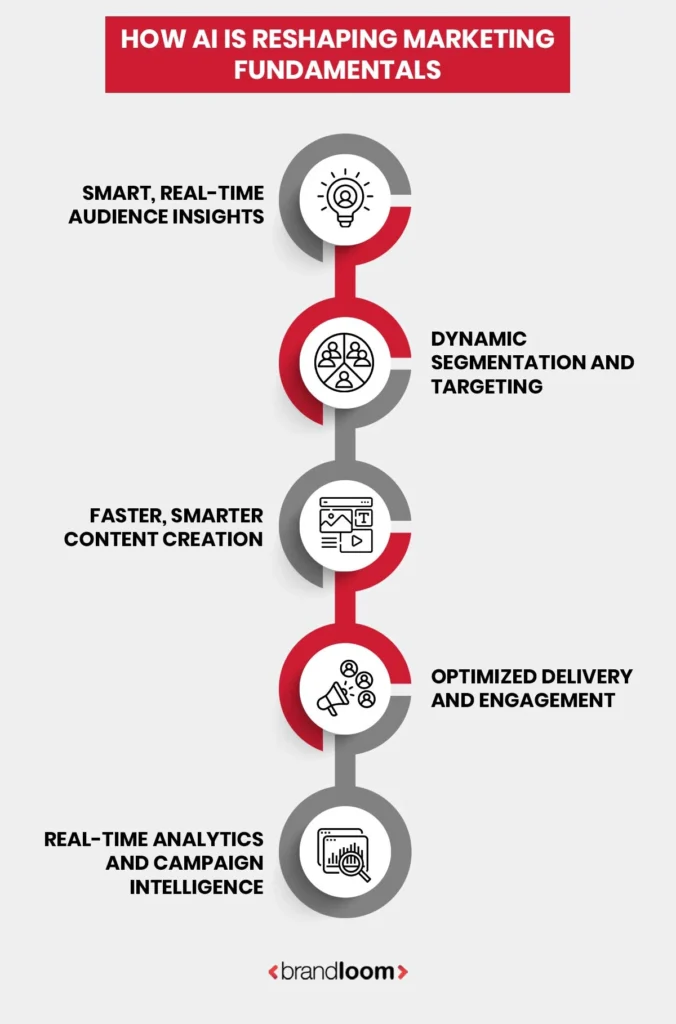
3. Faster, Smarter Content Creation
Creating quality content at scale is one of the biggest challenges for modern marketing teams. With AI-generated content, brands can produce personalized blog outlines, email copy, and ad creatives in minutes.
Thanks to advances in natural language processing, the output feels natural, relevant, and conversion-focused. This means your content team spends less time drafting and more time strategizing
4. Optimized Delivery and Engagement
AI doesn’t just create content—it helps you deliver it effectively. Algorithms analyze when and where users are most active, optimizing send times, subject lines, and formats for each platform. Whether it’s email, search, or social media, your campaigns become smarter with every iteration.
Tools like AI-powered chatbots further support this shift by offering instant, intelligent engagement across the customer journey.
5. Real-Time Analytics and Campaign Intelligence
One of AI’s most powerful applications is in campaign analytics. Rather than waiting for post-campaign reports, marketers now gain real-time insights into performance metrics. AI tools help identify what’s working, why it’s working, and how to improve results on the fly.
This proactive feedback loop enables quicker decision-making and a better return on investment (ROI).
The shift to AI-first marketing is no longer optional. Companies that embrace it are already seeing lower acquisition costs, stronger pipelines, and improved customer retention.
But we understand that the transition can feel overwhelming. That’s why BrandLoom—recognized as a top digital marketing agency in India—helps growth-focused companies adopt AI tools, streamline workflows, and enhance customer experiences with clarity and confidence. We’re not here to automate marketing. We’re here to elevate it.
How to Use AI in Digital Marketing
AI is no longer experimental—it’s operational. Leading marketing teams use it to improve precision, reduce waste, and scale performance across multiple touchpoints. Below are the most impactful use cases where AI in digital marketing delivers measurable results.
1. Personalized Content Recommendations
AI analyzes user data to deliver content that matches individual interests and behaviors. Whether it’s product suggestions, articles, or webinars, AI curates content based on real-time engagement.
This not only improves relevance but also drives time-on-site and conversion rates. Tools like Personyze.ai and Magileads.com are helping B2B brands create smarter, personalized buyer journeys that evolve with every interaction.
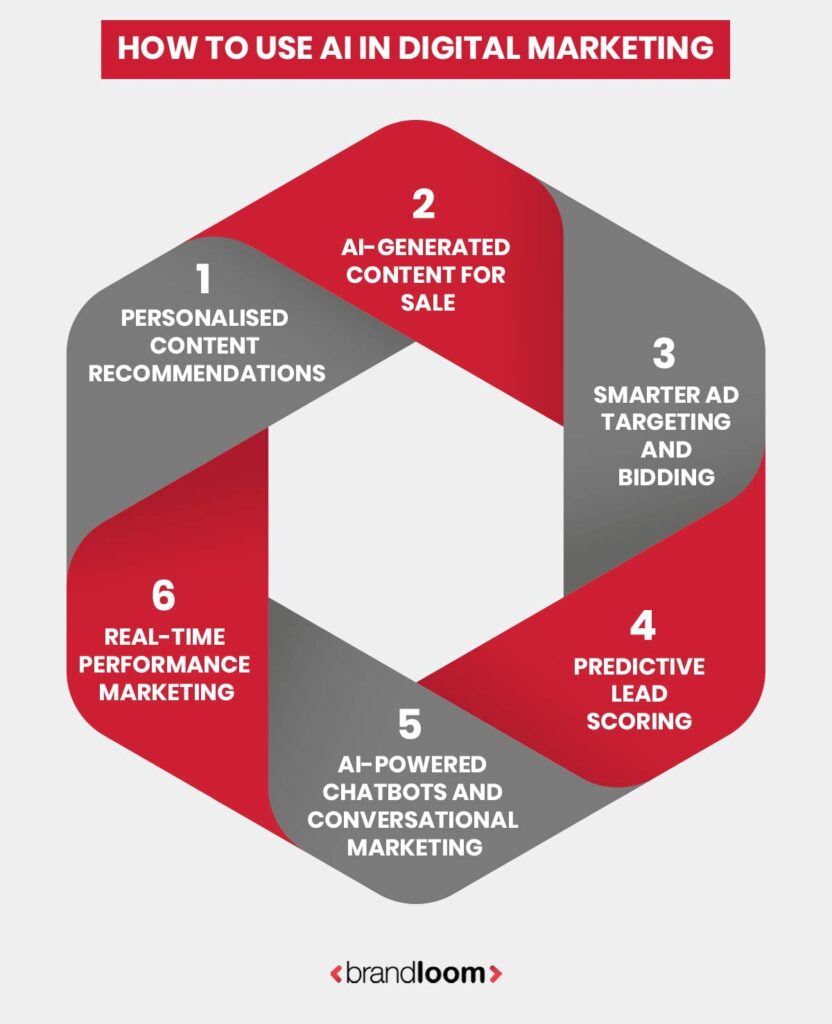
2. AI-Generated Content for Scale
Manual content creation takes time and often slows down campaign execution. With AI-generated content, marketers can speed up the production of blog intros, email subject lines, meta descriptions, and even full articles.
Using natural language processing, these tools create clear, brand-aligned messaging that’s easy to scale. This doesn’t just save time—it ensures consistency and relevance across all channels.
3. Smarter Ad Targeting and Bidding
AI improves the efficiency of digital ad campaigns by automating audience targeting and bid adjustments. Platforms like Google Ads now use machine learning to determine when and where your ads should appear for maximum ROI.
This leads to more effective marketing efforts, especially when managing multi-platform or global campaigns. With fewer manual tweaks and more real-time learning, marketers achieve better outcomes with less friction.
4. Predictive Lead Scoring
For sales-driven organizations, knowing which leads are most likely to convert is essential. AI-based predictive analytics utilizes historical and behavioral data to automatically score leads, enabling sales and marketing teams to prioritize the most promising prospects.
This ensures your outreach is timely, relevant, and aligned with real buyer intent.
5. AI-Powered Chatbots and Conversational Marketing
AI-driven chatbots are now an integral part of modern marketing stacks. They handle inquiries, qualify leads, and schedule demos—all without human intervention.
Available 24/7, these bots provide instant support while gathering valuable customer insights. Businesses that utilize AI-powered chatbots experience improvements in engagement, lead capture, and customer satisfaction.
6. Real-Time Performance Monitoring
AI tools provide campaign analytics that extend beyond basic dashboards. They detect patterns, identify weak spots, and suggest actionable optimizations—sometimes before humans notice an issue.
Instead of reacting post-launch, teams can adjust campaigns in real time, keeping performance high and budgets on track.
How AI Is Transforming Every Corner of Digital Marketing
As artificial intelligence becomes more embedded in digital workflows, marketing teams are increasingly turning to specialized AI tools to improve speed, precision, and performance. But success isn’t just about using AI—it’s about using the right AI tools in the proper context. Below are some of the most potent tools reshaping digital marketing functions today.
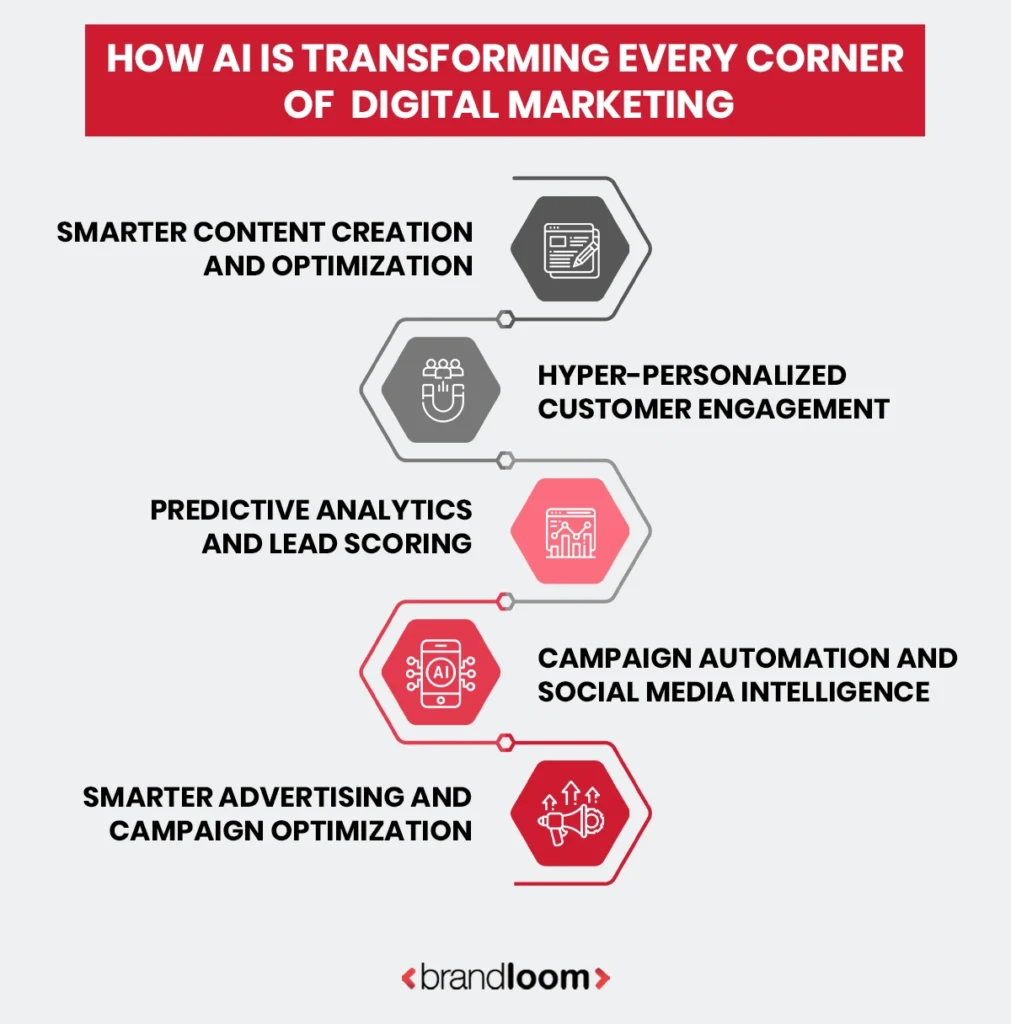
1. Smarter Content Creation and Optimization
Content is still king, but creating and optimizing high-quality content at scale is one of the biggest challenges for marketing teams. AI tools are bridging that gap.
- Jasper and Writesonic are popular platforms that utilize natural language processing to help marketers quickly generate blog posts, email copy, product descriptions, and other content. These tools can adapt tone, structure, and vocabulary to match your brand voice while reducing content development time by 50% or more.
- Tools like SurferSEO and Clearscope take this a step further by analyzing top-performing content and guiding your writers with keyword suggestions, semantic phrases, readability scores, and structural improvements—all aligned with search engine algorithms.
- For polishing content, Grammarly Business and Quillbot use AI to improve grammar, clarity, and tone, ensuring that everything you publish is both professional and on-brand.
These tools not only save time but also boost content quality and discoverability across search and social channels.
2. Hyper-Personalized Customer Engagement
Customers today expect personalized, seamless experiences across every touchpoint. AI helps make that happen at scale.
- Platforms like Personyze, Dynamic Yield, and Personizely enable marketers to create highly tailored website experiences by adapting content in real-time, based on user behavior, device type, location, or previous actions. This can lead to higher engagement, better conversion rates, and enhanced customer retention.
- Salesforce Marketing Cloud and HubSpot utilize AI to create intelligent workflows that dynamically segment audiences and send personalized messages at the optimal time, whether it’s an email, push notification, or retargeting ad.
- On the conversational front, tools like Intercom and Drift utilize AI-powered chatbots to qualify leads, answer frequently asked questions (FAQs), and route inquiries to human representatives—all while learning from past interactions to improve over time.
These platforms shift the focus from mass communication to intelligent, experience-driven marketing.
3. Predictive Analytics and Lead Scoring
AI doesn’t just analyze what happened—it helps predict what will. That’s a game-changer for demand generation and pipeline acceleration.
- 6sense, Leadspace, and MadKudu analyze behavioral data, firmographics, and third-party intent signals to score leads and accounts. This ensures your sales team focuses on high-potential opportunities while marketing nurtures leads that aren’t yet sales-ready.
- Pardot Einstein and Zoho Zia integrate AI with CRM systems to suggest the next best action, detect churn risks, and estimate deal close probabilities.
These insights help B2B marketing teams reduce lead waste, shorten sales cycles, and improve alignment with sales.
4. Campaign Automation and Social Media Intelligence
Campaign management is becoming faster, wiser, and more reactive—thanks to AI.
- Lately.ai utilizes AI to transform long-form assets, such as blogs and webinars, into dozens of pre-written social media posts, enabling your team to stay active and consistent without starting from scratch every time.
- Visual platforms like Canva’s Magic Write and Copy.ai help generate branded creatives and copy quickly for social media, ads, and presentations—perfect for lean teams.
- Social media management platforms like Sprout Social and Hootsuite now include AI-powered suggestions for best posting times, content themes, and performance forecasts—helping teams post with precision rather than guesswork.
5. Smarter Advertising and Campaign Optimization
AI is also transforming how marketers run and refine digital ad campaigns.
- Google Performance Max and Meta Advantage+ automate bidding, targeting, and creative testing across platforms, using conversion data to refine results constantly.
- Tools like Revealbot, Adzooma, and Smartly.io automate budget allocation, detect underperforming ads, and suggest A/B test ideas—significantly improving ROI without constant manual oversight.
Adopting the right AI tools means more than saving time—it means transforming how marketing teams think, operate, and deliver value. The tools mentioned here represent just a fraction of what’s possible when you leverage AI as a strategic advantage.
Advantages of AI in Digital Marketing
Artificial Intelligence (AI) is no longer a future trend—it’s a present-day competitive advantage. In digital marketing, AI improves how businesses connect, convert, and communicate. It automates processes, reveals insights, and powers personalization at scale. For brands looking to stay ahead, the benefits of AI in digital marketing are both immediate and long-term.
Let’s explore the key advantages:
1. Data-Driven Decision Making
AI thrives on data. It can process massive datasets in seconds—far faster than human teams. Whether you’re running paid ads, email campaigns, or SEO strategies, AI turns raw data into actionable insights. Machine learning algorithms identify what’s working, what’s not, and where to optimize next.
For example, AI can highlight which customer segments engage most with a specific offer, or which channels deliver the best ROI. This kind of predictive analytics helps marketing teams make smarter, faster decisions.
2. Hyper-Personalization at Scale
Customers expect relevant, timely content. AI makes it possible to deliver that across thousands of users—without manual effort.
AI tools track user behavior, preferences, and past actions. Based on this data, they tailor content, offers, and messages in real time. Whether it’s a personalized email, landing page, or product recommendation, AI ensures every interaction feels more relevant.
This leads to better customer experiences, increased engagement, and higher conversion rates. Personalization, once a luxury, is now a necessity—and AI delivers it at scale.
3. Enhanced Content Creation and Optimization
Creating high-quality content consistently is a major challenge. AI helps solve that. Tools like Jasper, Copy.ai, and ChatGPT assist with drafting AI-generated content—from blog posts and product descriptions to social media captions.
AI also optimizes content for SEO using tools like SurferSEO or Clearscope. It analyzes top-ranking content, suggests keywords, and checks for readability and relevance. This helps your team create smarter content that ranks—and resonates.
With AI, marketers can speed up production without compromising quality.
4. Smarter Ad Targeting and Campaign Optimization
Digital ads are only as effective as the targeting behind them. AI improves that by analyzing browsing patterns, engagement history, and demographics to deliver precise, real-time targeting.
Platforms like Google Ads and Meta use AI to adjust bids, creatives, and audience selection automatically. Marketers no longer need to guess which combination will work—AI tests and learns continuously.
This reduces ad waste, increases reach, and improves ROI—making your marketing efforts more cost-effective.
5. 24/7 Customer Support with AI-Powered Chatbots
Customers want quick answers, anytime. AI-powered chatbots enable round-the-clock support without extra headcount. These bots use natural language processing to understand queries and respond in real time.
Whether guiding a user through a product demo or resolving a billing issue, chatbots enhance support while freeing up human agents for complex tasks. This improves satisfaction and builds trust at every touchpoint.
6. Time and Resource Efficiency
Perhaps the biggest advantage? Time. AI handles repetitive tasks—like scheduling, reporting, testing, and tagging—so your team can focus on strategy and creativity.
By streamlining operations and reducing manual workload, AI drives efficiency across the board. You get more done, with fewer resources.
The advantages of leveraging AI in digital marketing are too significant to ignore. For businesses ready to scale and adapt, AI isn’t just helpful—it’s essential. It amplifies creativity, enhances strategy, and turns insight into action.
Limitations of AI in Digital Marketing
While the benefits of AI in digital marketing are substantial, it’s important to understand its limitations. AI is a powerful enabler—but it’s not a magic bullet. Knowing where AI falls short can help businesses use it more effectively and avoid common pitfalls.
1. Lack of Human Creativity and Emotional Intelligence
AI excels at pattern recognition and automation—but it can’t replicate human creativity or emotional nuance. Many AI-generated content tools can produce grammatically correct copy, but they often lack originality, storytelling depth, and emotional resonance.
For B2B brands, where trust and authority matter, content needs to reflect thought leadership—not just keywords. AI can support content teams, but it can’t replace strategic thinking, voice, or brand empathy.
2. Dependence on Data Quality
AI is only as good as the data it learns from. If your marketing data is outdated, biased, or incomplete, the AI model will reflect those flaws. For example, predictive analytics tools may misidentify target segments or recommend strategies that don’t align with actual customer behavior.
Cleaning and managing data is a constant task. AI doesn’t solve poor data governance—it amplifies its consequences. Businesses must invest in strong data practices before fully relying on machine learning models for decision-making.
3. Black Box Algorithms and Lack of Transparency
Many AI tools operate as black boxes. They deliver results, but it’s unclear how they reached them. This lack of transparency can be risky, especially in regulated industries or when making high-stakes decisions like ad targeting or lead scoring.
Without explainability, marketers may struggle to justify AI-generated outcomes—or catch critical mistakes. Ethical AI frameworks and regular audits are necessary to maintain control and accountability.
4. Limited Contextual Understanding
AI struggles with nuance, sarcasm, cultural context, or industry-specific language. This can lead to miscommunication in customer interactions or poorly targeted messaging. For example, a chatbot might misinterpret a complex query, frustrating the user instead of helping them.
Similarly, AI-generated headlines or summaries may miss the main point or overpromise. Human review is still essential to maintain quality and avoid brand missteps.
5. Over-Automation Risks
Relying too heavily on AI can make marketing feel impersonal or robotic. Automated messages, poorly timed recommendations, or irrelevant retargeting can erode customer experience instead of improving it.
Balance is key. AI should support your team, not replace the human touch. Personal follow-ups, creative storytelling, and empathy-driven campaigns still require marketers at the helm.
6. Implementation and Integration Challenges
Adopting AI is not plug-and-play. It often requires technical setup, staff training, process changes, and ongoing oversight. Many businesses underestimate the time and investment needed to fully integrate AI into their digital marketing strategy.
Without a clear roadmap, teams may abandon AI projects prematurely or use them ineffectively. That’s why it’s critical to assess readiness, build internal capabilities, or work with experienced partners before scaling AI initiatives.
AI is a game-changer—but it’s not infallible. To maximize its value, businesses must combine AI’s speed and intelligence with human creativity, ethical oversight, and strong data discipline. Understanding its limits is just as important as embracing its power.
The Future of AI in Digital Marketing
AI has already transformed how marketing teams operate. But we’re still in the early stages. In the next few years, AI in digital marketing will go from being a tool that supports campaigns to a central force that drives entire marketing strategies.
So, what does the future look like—and how can businesses prepare?
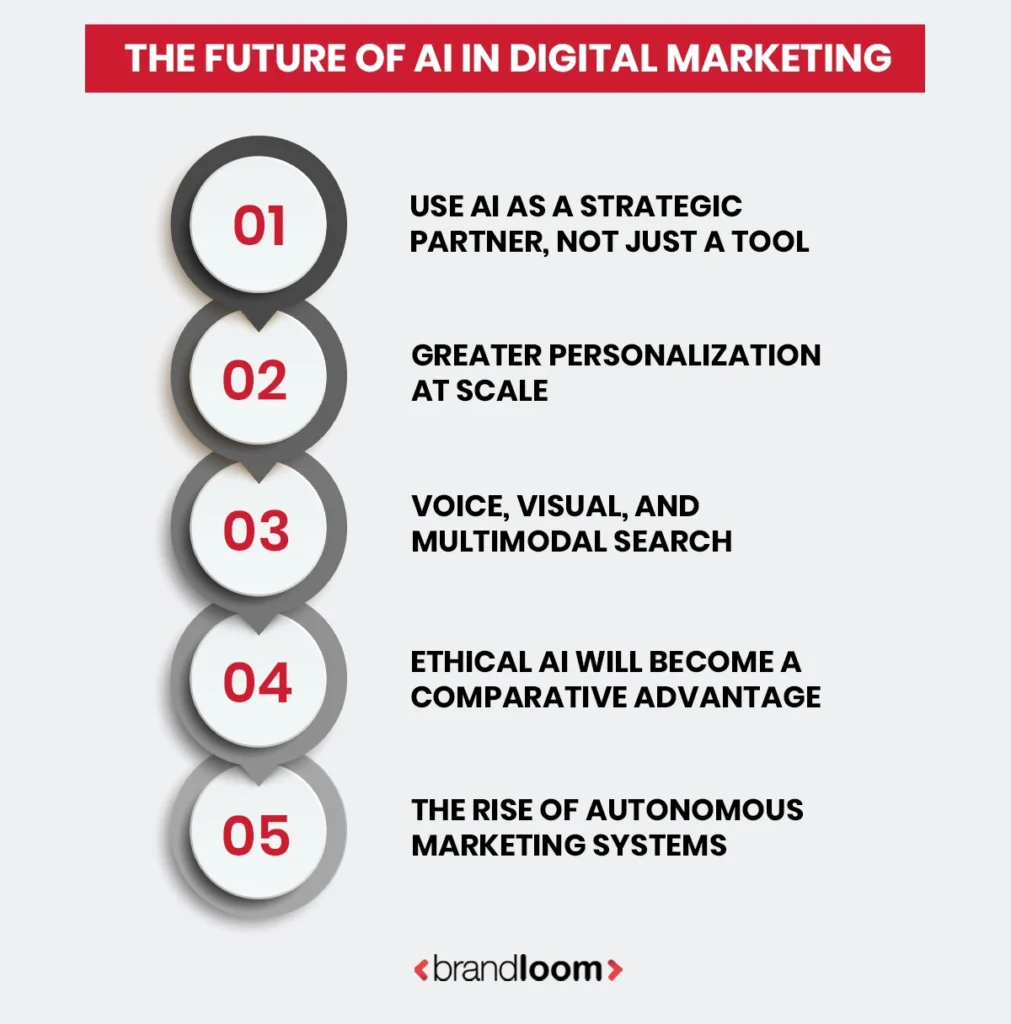
1. AI as a Strategic Partner, Not Just a Tool
Today, AI assists with content, campaigns, and analytics. In the near future, it will take on more strategic roles—offering recommendations on budget allocation, cross-channel strategy, and creative direction based on real-time performance.
Imagine a platform that not only tells you which email subject line works best, but also suggests how to reposition your value proposition based on customer sentiment and competitor behavior. That’s where AI-driven marketing is heading.
Companies that train their teams to think with AI—not just use it—will gain a serious edge.
2. Greater Personalization at Scale
AI’s ability to personalize experiences will grow more refined. We’ll move beyond basic name insertions or product suggestions to fully customized user journeys.
With the help of machine learning and predictive analytics, brands will deliver dynamic content that adjusts in real time—not just based on who the customer is, but also on how they’re feeling, what they’ve seen before, and where they’re likely to go next.
This level of personalization will raise the bar for customer experiences across every industry.
3. Voice, Visual, and Multimodal Search
As natural language processing improves, customers will search using voice, images, or even gestures. Marketers will need to optimize not just for keywords, but also for intent, tone, and context.
AI will play a major role in helping brands prepare for this shift. From AI-powered SEO tools to automated tagging and voice content generation, forward-thinking companies are already laying the groundwork.
4. Ethical AI Will Become a Competitive Advantage
As consumers and regulators become more conscious of how data is used, businesses that adopt ethical, transparent AI practices will win more trust.
This includes being open about how algorithms make decisions, ensuring inclusivity in AI training data, and offering users control over their data.
In a world where saving time is no longer enough, trust and ethics will become key differentiators for B2B brands.
5. The Rise of Autonomous Marketing Systems
Autonomous marketing is the next big leap. These are systems that can plan, execute, optimize, and report on campaigns with minimal human input. They won’t just assist marketers—they’ll act as always-on engines for growth.
We’re already seeing early signs in AI tools for marketing that manage paid campaigns, auto-adjust messaging, and adapt content formats across platforms.
Companies that start experimenting with these systems today will be better prepared to scale without ballooning their marketing overhead.
The bottom line? The role of AI in digital marketing is evolving rapidly. It’s not about replacing marketers—it’s about amplifying what’s possible.
Organizations that thoughtfully, ethically, and strategically embrace AI will be the ones shaping the future, not merely reacting to it.
Case Studies: Real-World Examples of AI in Action at BrandLoom
1. Whey Protein Brand Scales D2C Sales with AI-Powered Personalization
A growing whey protein brand was struggling with low customer retention and high acquisition costs. BrandLoom introduced AI-driven customer segmentation and predictive analytics to understand user behavior. Using real-time data, we personalized product recommendations and email sequences based on fitness goals, purchase history, and usage frequency.
Within three months:
- Repeat purchase rate increased by 42%
- Cart abandonment dropped by 18%
- Monthly D2C sales grew 2.4×
AI also helped optimize influencer campaigns by identifying micro-segments more likely to engage with functional fitness content.
2. Fashion Label Boosts Engagement Using AI-Generated Content and Predictive Analytics
An India-based women’s fashion label was producing high volumes of content but saw poor engagement. BrandLoom integrated AI-generated content tools to create data-backed blog posts, email copy, and product descriptions tailored to different personas.
We paired this with predictive analytics to determine what styles were likely to trend next season. This insight guided inventory decisions and ad targeting across Meta and Google.
Results after 90 days:
- 3× increase in blog engagement
- 27% drop in cost-per-click (CPC)
- 35% lift in email open rates
- Stock-outs reduced by aligning production with predicted demand
3. Fintech SaaS Company Reduces Lead Qualification Time with AI Chatbots
A B2B fintech startup faced poor lead quality and overloaded sales reps. BrandLoom deployed a smart AI chatbot on the website, capable of qualifying leads using conversational logic and real-time integrations with CRM and analytics tools.
The chatbot collected firmographic details, scheduled demos, and routed only qualified leads to the sales team.
Within two months:
- Lead qualification time reduced by 60%
- Sales conversion rate improved by 21%
- Sales team efficiency doubled, enabling them to focus on high-value accounts
4. EdTech Platform Personalizes User Experience with Machine Learning Models
An edtech platform offering upskilling courses lacked personalization across touchpoints. BrandLoom implemented a machine learning-based recommendation engine that suggested courses based on user behavior, skill gaps, and progression rate.
We also used AI-powered email marketing tools to automate personalized journeys—from onboarding to course completion.
Key outcomes:
- Course completion rate jumped by 34%
- Average time spent on platform increased by 29%
- Upsell revenue grew by 18%
AI insights also helped reduce churn by identifying at-risk users and triggering automated retention workflows.
5. Interior Design Brand Uses AI-Powered Visual Recognition to Generate Qualified Leads
A luxury interior design brand struggled to attract the right leads online. BrandLoom implemented a visual search AI tool that let users upload inspiration images to discover matching design themes from the brand’s portfolio.
Combined with heatmap analytics and AI-based targeting, the website experience was rebuilt to deliver personalized consultations and moodboard suggestions.
Results in 10 weeks:
- Qualified lead generation increased by 53%
- Bounce rate decreased by 35%
- Average lead value improved by 2.1×
The brand’s online experience was transformed into a high-converting showroom, driven by AI.
How to Choose the Right AI Tools for Your Business
With hundreds of AI platforms promising more brilliant campaigns, faster execution, and better ROI, choosing the right tool can feel overwhelming. Not every tool suits every business. And when it comes to AI in digital marketing, what works for a B2C retail brand may not work for a B2B service provider.
Here’s how to evaluate and invest in the AI tools for marketing that align with your goals, team, and strategy.
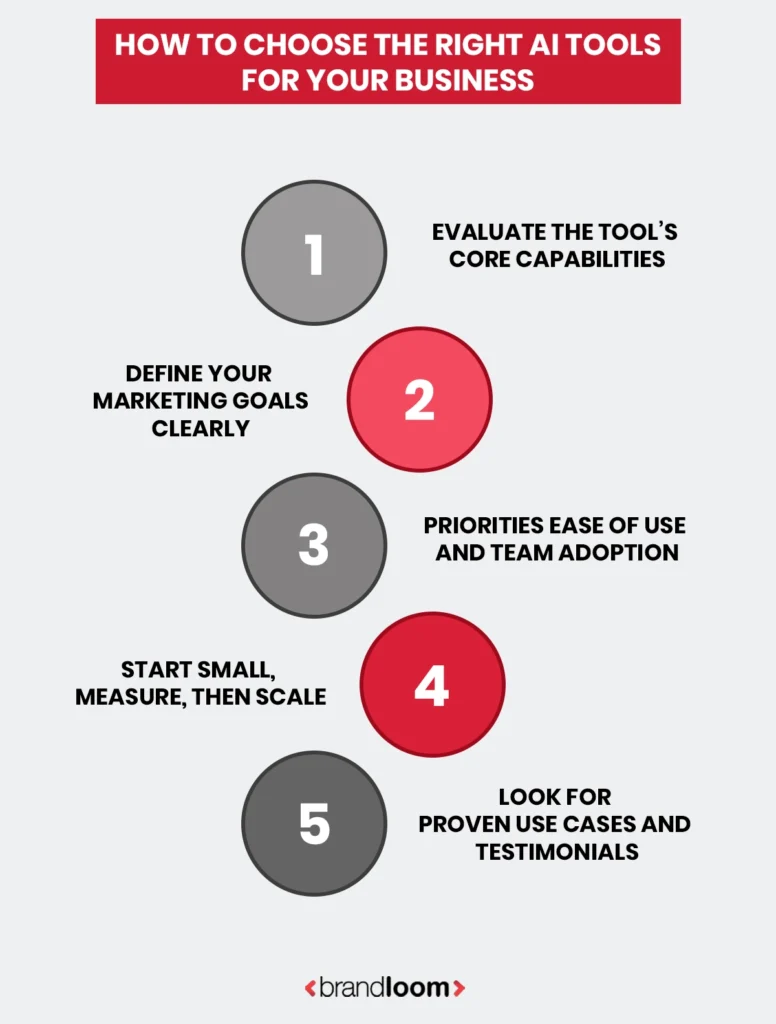
1. Define Your Marketing Goals Clearly
Start with what you’re trying to solve. Are you looking to:
- Streamline content creation?
- Automate campaign optimization?
- Personalize customer experiences?
- Improve lead scoring or predictive analytics?
Once your goals are clear, you can look for tools that serve specific functions—whether it’s AI-powered copywriting, audience segmentation, or SEO automation.
Pro tip: Avoid buying the trend. Invest in AI that supports your current funnel—and scales with it.
2. Evaluate the Tool’s Core Capabilities
Not all AI tools are built equally. Some rely heavily on machine learning, others specialize in natural language processing or image generation.
Look for tools that offer:
- Transparency in how decisions are made (especially in ad automation and targeting)
- The ability to integrate with your current martech stack
- User control for manual overrides when needed
If the AI makes autonomous decisions, ensure you can still track the logic behind them.
3. Prioritize Ease of Use and Team Adoption
A feature-rich platform is useless if your team can’t—or won’t—use it. Select AI tools that feature intuitive interfaces, comprehensive learning resources, and robust support.
The right tool will enhance your marketing efforts without creating a steep learning curve. It should be an extension of your strategy, not a constant disruption.
At BrandLoom, we help businesses audit their tech stack and identify where AI can deliver the most significant return on investment (ROI) without overwhelming their teams.
4. Look for Proven Use Cases and Testimonials
Before you invest, ask:
- Who else is using this tool?
- Are there case studies in your industry?
- What kind of blog posts, reviews, or thought leadership is coming from the company?
Established platforms will often have examples of how they’ve helped brands improve open rates, boost conversions, or reduce cost-per-acquisition. These stories matter when you’re committing budget and bandwidth.
5. Start Small, Measure, Then Scale
Even the best AI tools need tuning. Start with one or two small use cases, such as automating A/B testing or utilizing AI-generated content for email marketing.
Measure outcomes rigorously:
- Is the tool saving time?
- Is it delivering high-quality outputs?
- Is it reducing manual workload without compromising results?
Once you achieve consistent performance, expand to other areas, such as social media automation, chatbot integration, or lead qualification.
Choosing the right AI marketing tools isn’t about getting the most features—it’s about getting the right fit. At BrandLoom, we’ve helped dozens of brands unlock value from AI by matching strategy with smart tech. Whether you’re just starting or ready to scale, the right AI tools can be a growth multiplier—if chosen wisely.
Conclusion
The role of AI in digital marketing has evolved from experimental to essential. It’s no longer a matter of whether businesses should adopt AI, but how strategically they do it.
From AI-generated content and real-time personalization to campaign optimization and in-depth audience insights, AI is enabling brands to do more with less while creating more relevant, engaging, and compelling customer experiences. It’s not about replacing marketers, but empowering them to think bigger, act faster, and reach further.
But as we’ve seen, success doesn’t lie in just having access to tools. It lies in choosing the right ones, aligning them with clear goals, and building a team that knows how to leverage AI meaningfully. Businesses that treat AI as a short-term hack may gain short-term wins. But those who treat it as a long-term partner in innovation will own the next decade of growth.
If your organization is still debating how—or where—to begin, the answer is simple: start small, but start now. Whether it’s automating repetitive tasks, improving ad targeting, or personalizing content at scale, there’s an AI use case that fits your funnel.
And if you’re looking for guidance, insight, or executive support, partnering with the top digital marketing agency in India could fast-track your transformation. Brandloom can help you audit your existing marketing stack, integrate AI seamlessly, and train your team to lead with it.
In the coming years, digital marketing will not just be powered by AI. It will be shaped by the brands bold enough to embrace it fully.
Frequently Asked Questions
AI in digital marketing empowers brands to make faster, data-driven decisions. It automates repetitive tasks, optimizes content, and personalizes customer experiences. From AI-generated content to predictive insights, businesses can scale smarter.
At BrandLoom, we’ve seen how integrating AI tools into campaigns improves performance across channels. As customer expectations grow, AI ensures marketers stay relevant, responsive, and ROI-focused. It’s no longer a futuristic tool—it’s the engine behind modern marketing success.
AI is used throughout the digital marketing strategy lifecycle. It powers customer segmentation, automates A/B testing, and predicts behaviors using machine learning. Marketers use AI to generate content, optimize SEO, personalize emails, and even place ads in real time.
At BrandLoom, we deploy AI to help brands create smarter campaigns—from chatbot integration to performance analytics. The result? Better targeting, higher engagement, and more efficient marketing efforts. AI helps marketers focus on strategy while automating the repetitive.
The scope of AI in digital marketing is expanding rapidly. From natural language processing in customer interactions to real-time content recommendations, AI is becoming central to personalized marketing. As more brands embrace automation and data intelligence, AI will shift marketing from reactive to predictive.
Businesses can use AI not just for execution, but for ideation and strategic planning. At BrandLoom, we help companies unlock these possibilities—turning AI from a buzzword into a competitive edge. The future belongs to those who integrate AI early and use it purposefully.
AI boosts ROI by turning data into action. It tracks campaign performance in real time and adjusts content, targeting, and spend accordingly. AI reduces wasted ad spend, automates testing, and increases conversion accuracy.
With tools like predictive modeling and intelligent segmentation, marketers can reach the right audience at the right time. At BrandLoom, we guide brands in selecting and applying the right AI tools to achieve their goals faster—whether that’s lead generation, customer retention, or sales growth. With the right approach, AI turns strategy into measurable success.
Popular AI tools for marketing include Jasper, Copy.ai, ChatGPT, and SurferSEO for content; HubSpot and Marketo for automation; and Adzooma and Smartly.io for ad management. Other platforms like Personyze and Crayon help personalize user journeys and monitor competitors.
At BrandLoom, we help clients audit and integrate the best mix of AI solutions for their goals, ensuring they get ROI, not just features. Whether it’s for social media, SEO, or CRM, the right stack delivers efficiency and growth.
Yes—AI is transforming how marketers create and personalize content. Tools like ChatGPT and Jasper generate blog posts, ad copy, and product descriptions in seconds. AI uses behavioral data to deliver personalized messages based on interests, location, or behavior.
At BrandLoom, we help businesses integrate these tools to scale content creation without sacrificing quality. Our AI-driven workflows ensure that each message aligns with audience intent and brand tone. While AI can’t replace creativity, it enhances it—driving stronger engagement, loyalty, and faster content delivery that feels timely and relevant.
AI sharpens ad targeting by analyzing behavioral, demographic, and contextual data in real time. It identifies high-conversion audiences and adjusts bids, formats, and placements dynamically. At BrandLoom, we use AI to personalize ad creatives based on intent signals, geography, and funnel stage—ensuring each ad resonates with its audience.
With platforms like Meta and Google using AI-powered algorithms, marketers can focus on messaging while the tech handles micro-optimizations. This results in smarter spend, higher-quality leads, and measurable performance lift across campaigns.
Absolutely. AI enhances landing page performance through A/B testing, heatmap analysis, and behavioral personalization. Tools like Unbounce and Dynamic Yield suggest layout changes, while AI copy tools adapt messaging for different segments.
At BrandLoom, we use AI to track user interaction, optimize content blocks, and personalize CTAs—resulting in higher engagement and faster conversions. Our AI-led CRO strategies reduce bounce rates and improve user experience, all while giving marketers clearer insight into what’s working and why. With AI, landing pages become more than static assets—they become adaptive sales tools.
AI-powered chatbots are intelligent virtual assistants that use natural language processing to resolve queries, guide users, and offer real-time support.
Available 24/7, they handle routine interactions, reduce human workload, and enhance the overall customer experience. At BrandLoom, we implement AI chatbots that are deeply integrated with CRM systems—ensuring faster lead qualification, smoother handovers, and better analytics.
For B2B brands, our bots also book demos, segment leads, and deliver personalized messaging. Chatbots aren’t just for service—they’re key to creating scalable, intelligent customer journeys.
Yes. AI tracks how users interact with emails, websites, and ads—revealing friction points, trends, and conversion triggers. At BrandLoom, we use predictive analytics and heatmap tools to understand how users scroll, click, and bounce—then refine messaging and design accordingly.
AI enables us to run adaptive campaigns that adjust in real-time to user behavior. From optimizing CTAs to retargeting the right segment at the right time, behavioral insights drive smarter, data-backed decisions. The result? More relevant experiences and continuous performance improvement without guesswork.

